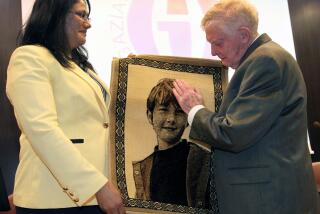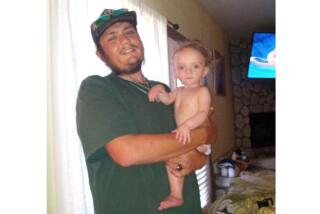Heart of Gold : 6-Year-Old Donor Gives Gift of Life
- Share via
A nationwide search to find a heart donor for Henry Marsico, an ailing 9-year-old Whittier boy, was barely a day old when doctors at UCLA Medical Center found the donor--a 6-year-old boy who died in a fall less than three miles from Henry’s home.
On Saturday, nine days after the operation that saved his life, Henry played computer games in his hospital room at UCLA while in Whittier, the family and friends of Danny Ramirez, the donor, paid their final respects to a boy who, in death, provided a lifesaving gift.
In the early hours of April 11, UCLA doctors removed the heart donated by the fatally injured youth and sewed it into Henry ‘s chest. It was a near perfect match for Henry, who had been suffering from the worsening effects of a congenital heart defect.
“I had believed Danny’s heart would do somebody some good, because he had a heart of gold,” said his father, Joe Ramirez, hours before he attended his son’s funeral with his wife, Laura, and their three children.
Standing silently among the mourners at the service Saturday was Joe Marsico, Henry’s father. He had come to the funeral to pay his own private respects. But he stood by himself, obeying a request by doctors to avoid contact with the Ramirez family.
Transplant specialists try to keep the families of donors and recipients unknown to each other in order not to cause psychological complications for the families. But the Ramirez and Marsico clans each read about the other family’s predicament in a local newspaper, then put two and two together.
“I can’t stop thinking about these people,” Marsico said. “The way the accident happened with the little boy. It was so useless, so senseless. Some parents would be so angry at everything. Then to have someone else approaching them for parts of their son’s body. For them to have the courage and insight to know how much they can help somebody, these parents are really special.”
Nurse Patty Sheehan, a heart transplant coordinator at UCLA, said that it is highly unusual for a heart donor to live so close to the recipient. “The donor is never usually within the same community like that,” she said.
Organs from Danny’s body have touched four lives, Ramirez said. His liver brought one child out of a critical coma. His kidneys took two children off dialysis. Henry had to be persuaded to accept the heart because he did not want to take it from someone who still needed it.
In his hospital room Saturday, Henry told his mother that he was already feeling Danny’s gift. His skin, once blue, was now a healthy pink.
“This guy inside me must have been warm all the time,” Henry said. “I’m warm all the time now.”
About 60 children Henry’s age or younger from across the country await donated hearts. Their names have been added to a national waiting list compiled by the United Network for Organ Sharing in Richmond, Va. The children typically wait six to 12 months, UCLA doctors say, before a transplant operation. Some die waiting.
Henry was at the point where only a heart transplant could save him. Among other problems, Henry’s arteries had developed in the wrong places. At 11 months old, doctors operated to clear an obstruction in his aorta, the main artery feeding oxygen-rich blood to his body. At 3, he had a second operation. Doctors put a band around his pulmonary artery because it was flooding his lungs with blood. When he reached 7, surgeons intervened again, putting in an artificial valve.
“He was not a candidate for anything but transplanting,” said Dr. Al Galindo, a pediatric cardiologist. “Henry would not have survived further surgery.”
With increasing frequency, Joe and Carol Marsico had to rush their son to the hospital to have blood pumped from his abdomen. The blood backed up in Henry’s stomach because his heart lacked the strength to recirculate it. His skin and fingernails developed a bluish tint. He grew weaker.
“We were driving him to school everyday and that was two blocks,” Joe Marsico said. “Without this heart, he probably wouldn’t have made it out of this year.”
Living less than three miles from the Marsicos, Danny Ramirez was an energetic first-grader, taller and heavier than Henry, even though he was three years younger.
Danny loved to make trays of mini peanut butter and jelly sandwiches and pitchers of instant punch that were “way too sweet,” said his mother. Then he’d announce: “Hors d’oeuvres anyone?” and giggle. He picked his mother a bouquet of flowers almost every day.
Danny enjoyed building models. He had a workbench where he mixed his own paints. Joe Ramirez promised his son he would buy a model kit of a submarine featured in the film “The Hunt for Red October” if Danny did well in school. Danny had just been named his class’s Student of the Month at Birney Elementary. The assembly to honor him was scheduled for Thursday, the day after he died.
On Tuesday morning, April 9, Danny and his 9-year-old brother, Lawrence, begged their mother for permission to walk the three blocks home from school like most other children on the street. The 30-year-old mother of four reluctantly agreed.
After school, at about 2:40 p.m., the brothers passed a United Parcel Service delivery truck parked near their house. Danny playfully climbed onto the back bumper. The driver did not see him and pulled away from the curb.
Danny held on until the truck reached about 25 m.p.h. He then fell or jumped off, according to police. He probably landed first on his feet, then flipped and hit his head, said Los Angeles County Sheriff’s Deputy Herbert Fell. Danny came to rest less than two houses from his front door.
Mechanic Joe Ramirez, 28, was tuning a diesel engine at a job in Santa Fe Springs when he got the call that his son had been rushed to Presbyterian Intercommunity Hospital in Whittier. At 4:30 p.m., doctors let him see his son.
“I tried telling him everything was going to be OK, and he’d come home to build a Red October model and be strong,” Ramirez said.
The next morning, after brain surgery, doctors ran tests that confirmed their worst fears. Danny’s brain showed no vital signs. Joe and Laura Ramirez agreed to donate their son’s organs.
“If it would save parents the heartache that we feel in losing our son, if those parents would get another chance at holding their child, playing with him and seeing him grow, then do whatever it takes,” Joe Ramirez said.
Henry will have to take medication for the rest of his life to keep his body from rejecting the new heart. More than 80% of transplant patients survive for more than a year. Doctors are hopeful Henry will do far better than that.
More to Read
Sign up for Essential California
The most important California stories and recommendations in your inbox every morning.
You may occasionally receive promotional content from the Los Angeles Times.














